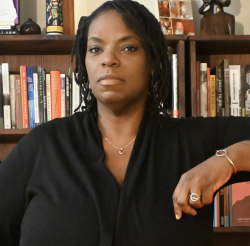Who We Are
The Institute for Black Intellectual and Cultural Life is a research center rooted in the study of the Black diaspora. Building on the strengths of Dartmouth's current Black faculty and staff, the Institute hosts visiting scholars, artists, activists, and postdocs and provides grants for Dartmouth faculty who are undertaking major research and creative projects related to the Institute's research themes.
We offer opportunities for collaborations that include lectures, symposia, performances, and/or working groups focused on different thematic areas. The centralized core of the Institute serves as the epicenter of knowledge production and creative output for Black diasporic subjects at Dartmouth and beyond.
With colloquia, seminars, and college-wide collaborations, the Institute for Black Intellectual and Cultural Life sustains an ecosystem through which the ideas of faculty, students and staff from across disciplinary boundaries are supported and resourced. The Institute serves as a creative collective for Black communities at Dartmouth invested in pursuits that align with the center's core mission.
The Institute sponsors initiatives, projects, and programming that anticipate and shape trends in the pursuit of knowledge production and social justice.

